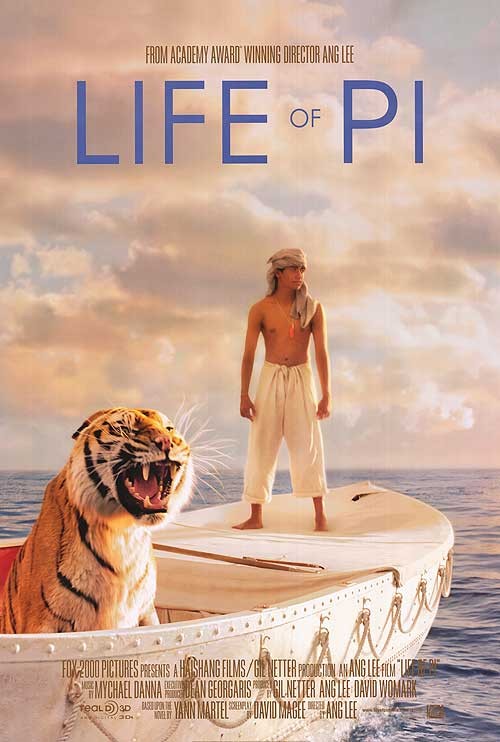
“Life of Pi”
“Life of Pi” is a hard film to pin down in one concrete category. Is it an adventure, an emotional drama, a fantasy epic, or a claustrophobic thriller? In the grand scheme of things, it’s all of those things rolled into one, coming together to present a story that is unlike the majority of mainstream cinema out there. Less complex (at least in plot) than “Cloud Atlas” but almost as ambitious in scope, I feel that “Life of Pi” could also be just as divisive with audiences, with hard cynics possibly scoffing at the faith-based storytelling and more fantastical elements on display. Allow yourself to become absorbed in the story though, and “Pi” could end up being very rewarding.
On a cross-oceanic trip from India with all their zoo animals in storage, Pi and his family are moving to Canada because of the political climate. On the way there, a strong storm manages to throw Pi overboard while the ship sinks with his family and the other sailors still inside. He manages to bring himself back to the lifeboat and gather some supplies, but he is not alone as multiple animals fight for space on the boat too. Eventually, only Pi’s Bengal tiger named Richard Parker is left on the boat, and Pi now has to deal with survival in the middle of the ocean while contending with the wild tiger trying to get at him.
It would be impossible to start a talk about “Life of Pi” without discussing the stunning visuals created by director Ang Lee (“Brokeback Mountain”) and the 3D cinematography by Claudio Miranda. This is, I would say, the absolute best 3D I have ever seen, even more so than “Hugo” and “Avatar.” There are some parallels to “Avatar” with the often hallucinogenic imagery created here, most notably in a nighttime scene where a school of luminescent jellyfish cover the ocean surface around the boat, but these sequences are played more as heightened reality instead of outright fantasy. Breathtaking shots such as the one where Pi is floating underwater as the lighted ship slowly sinks are the reasons we go to see movies on the big screen.
Rather than leaning on them as pure eye candy, Lee utilizes the visuals in ways that augment the story and the characters’ struggle. The scene of the boat resting in perfectly still and flat water, looking like a desert of the sea, enhances the sense of isolation Pi (and Richard) is going through. I must also commend Lee for having the stones to craft a $100 million budget film where not much happens, without any big stars, and the two leads are an Indian actor making his debut along with a digitally created tiger. As the only (human) actor with any substantial screen time, Suraj Sharma handles himself incredibly well, nailing both the intense determination Pi has to keep up with and the occasional comedic moment for levity in an otherwise somber film. I am also in awe at how the film was able to convince me that an entirely computer-generated tiger was interacting with a flesh and blood human. Richard Parker doesn’t have the subtle facial expressions of other digital characters like Gollum and Caesar, but then again he doesn’t have to talk anyway. He’s a bloodthirsty tiger through and through that wants to eat Pi the first chance he gets, but the special effects artists are able to form Richard into a fleshed out character as strong and memorable as Pi himself.
The adventures of Pi and Richard aren’t the only things going on here, as an older Pi (played by Irrfan Khan of “Slumdog Millionaire” fame) is narrating this entire story to a writer looking to turn it into a novel. This is where the aspects of faith are introduced into the story, with Pi telling the writer, “This is a story that will make you believe in God.” In his early years, Pi would practice multiple religions at the same time, so it’s unclear exactly which God he is referring too. I wouldn’t call myself an expert on religion, although there are many scenes and other aspects of the plot definitely meant to be symbols/metaphors for the various religions at play. The only issue I have with these scenes with old Pi is that they tend to over-explain themselves too much, as the film already did a fine job of establishing its more ambiguous qualities. It just felt a little frustrating to see a film that had greatly kept to the “show don’t tell” adage of film storytelling throughout only to take a step too far into spelling things out for confused viewers. The most egregious example of this is where the writer character pieces together a story Pi told the fishermen who eventually found him, leaving me to say to myself, “Yes I know I think we could put two and two together ourselves thank you very much.”
I won’t say “Life of Pi” is a film for everyone, although my screening was pretty packed the day after Thanksgiving. The deliberate pacing could turn away some and I can understand why others would be apprehensive about a film so upfront about religion, but I think the film goes beyond that. It’s the experience of going along with Pi on this existential journey and watching the relationship between him and Richard Parker mutually develop that gives “Life of Pi” its backbone, and at the very least you’ll be able to see some cool and astounding images to keep your senses alert.
3.5/4
